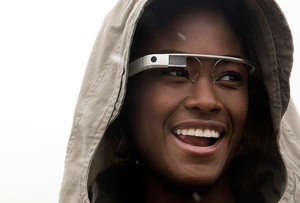#ifIhadglass

But I walked away convinced that this wasn’t just one of Google’s weird flights of fancy. The more I used Glass the more it made sense to me; the more I wanted it. If the team had told me I could sign up to have my current glasses augmented with Glass technology, I would have put pen to paper (and money in their hands) right then and there. And it’s that kind of stuff that will make the difference between this being a niche device for geeks and a product that everyone wants to experience.
After a few hours with Glass, I’ve decided that the question is no longer ‘if,’ but ‘when?’
You'll forgive me if I'm not terribly surprised by all of this. This is pretty much a spot-on manifestation of the next phase of the Participatory Panopticon. The first phase used cameraphones -- ubiquitous and useful, to be sure, but reactive: you had to take it out and do something to make it record. A cameraphone isn't a tool of a panopticon in your pocket. But a wearable system, particularly something that looks stylish and not "tech," leads to very different kinds of outcomes.
Here's a bit of something I wrote in 2005 ("personal memory assistant" was my term for a Google Glass-like device):
But the world of the participatory panopticon is not as interested in privacy, or even secrecy, as it is in lies. A police officer lying about hitting a protestor, a politician lying about human rights abuses, a potential new partner lying about past indiscretions -- all of these are harder in a world where everything might be on the record. The participatory panopticon is a world where accusations can easily be documented, where corporations will become more transparent to stakeholders as a matter of course, where officials may even be required to wear a recorder while on duty, simply to avoid situations where they are discovered to have been lying. It's a world where we can all be witnesses with perfect recall. Ironically, it's a world where trust is easy, because lying is hard.
But ask yourself: what would it really be like to have perfect memory? Relationships -- business, casual or personal -- are very often built on the consensual misrememberings of slights. Memories fade. Emotional wounds heal. The insult that seemed so important one day is soon gone. But personal memory assistants will allow people to play back what you really said, time and again, allow people to obsess over a momentary sneer or distracted gaze. Reputation networks will allow people to share those recordings, showing their friends (and their friends' friends, and so on) just how much of a cad you really are.
In the world of the Participatory Panopticon, it's not just politicians concerned about inadvertent gestures, quick glances or private frowns.
And avoiding it won't be as easy as simply agreeing to shut off the recorders. Unless you schedule your arguments, it's inevitable that something will be caught and archived. And if you leave your assistant off as a matter of course, you lose its value as an aid to recalling details that pass in an instant or didn't seem important at the time.
Moreover, if you turn your recorder off while those around you are still archiving their lives, you place yourself at a disadvantage -- it's not knowledge that's power, it's recall of and access to knowledge that's power.
The recently-posted video interview includes some of my more recent thinking on the topic.
It's a really big deal. There are enormous intellectual property implications here, and undoubtedly issues around distracted driving and whatnot. But for me, the truly important aspect is how it changes relationships. And as this becomes more commonplace, it will change relationships -- between business partners, spouses, parents and children, everyone.
And that's with the relatively simple technology of something like Google Glass. When we add things like active visual filtering and face recognition -- just look at someone and get their Twitter stream or Facebook page in front of you -- we get the third phase of the Participatory Panopticon. All of that's still ahead of us -- but the advent of Google Glass makes it much more likely to happen.
And, okay, I admit it. Even though we very modern futurists (who pooh-pooh "predictions" as the stuff of astrologers and TV pundits) are loathe to admit it, getting it right is a thrill. Laying out a forecast that, in the subsequent years, maps to an emerging reality is neat stuff, especially when the forecast includes various social components yet to show up. Add a catchy name and... well, you have the makings of a nice bullet point for the always-inevitable "hey Mr. Futurist, what predictions of yours have come true?" question.





